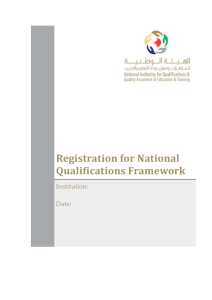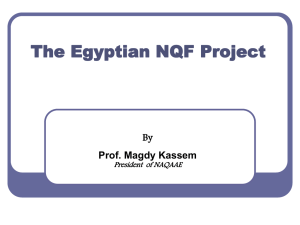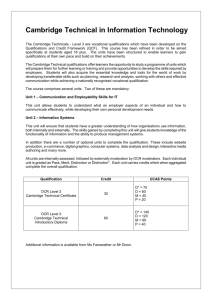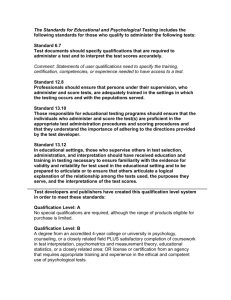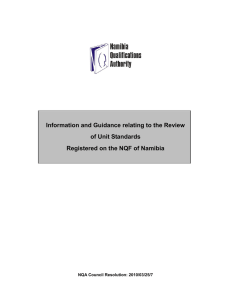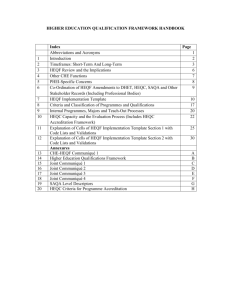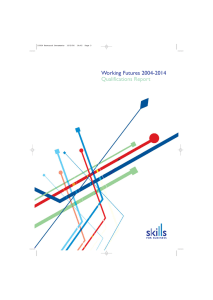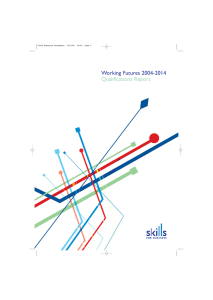NATIONAL QUALIFICATION FRAMEWORKS IN
advertisement
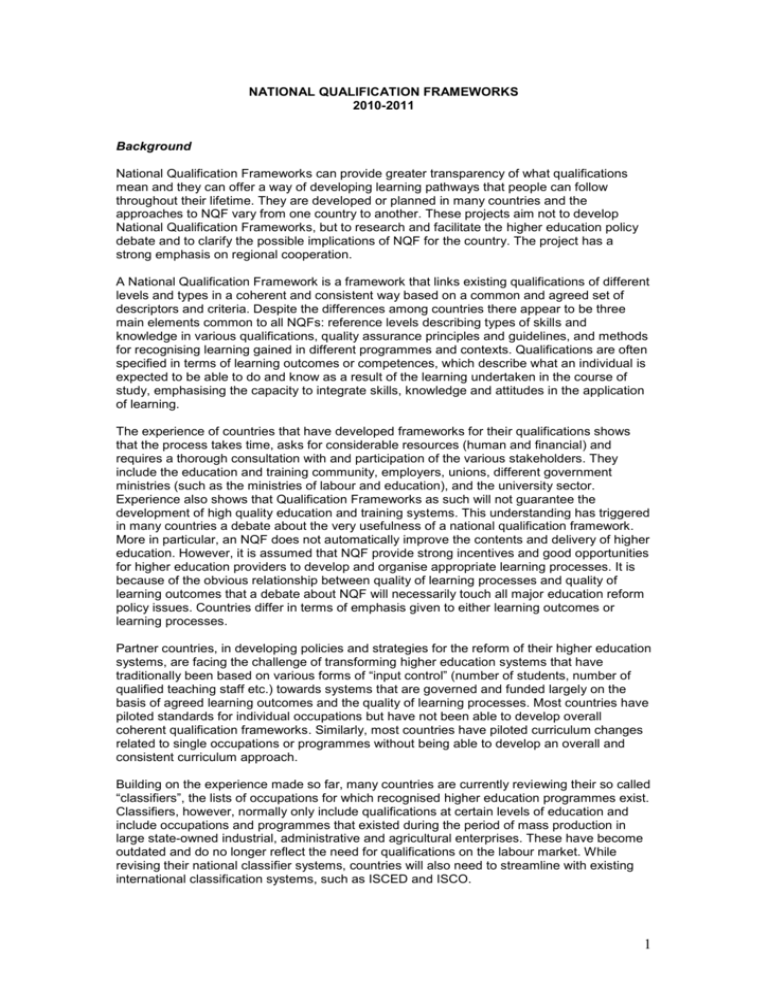
NATIONAL QUALIFICATION FRAMEWORKS 2010-2011 Background National Qualification Frameworks can provide greater transparency of what qualifications mean and they can offer a way of developing learning pathways that people can follow throughout their lifetime. They are developed or planned in many countries and the approaches to NQF vary from one country to another. These projects aim not to develop National Qualification Frameworks, but to research and facilitate the higher education policy debate and to clarify the possible implications of NQF for the country. The project has a strong emphasis on regional cooperation. A National Qualification Framework is a framework that links existing qualifications of different levels and types in a coherent and consistent way based on a common and agreed set of descriptors and criteria. Despite the differences among countries there appear to be three main elements common to all NQFs: reference levels describing types of skills and knowledge in various qualifications, quality assurance principles and guidelines, and methods for recognising learning gained in different programmes and contexts. Qualifications are often specified in terms of learning outcomes or competences, which describe what an individual is expected to be able to do and know as a result of the learning undertaken in the course of study, emphasising the capacity to integrate skills, knowledge and attitudes in the application of learning. The experience of countries that have developed frameworks for their qualifications shows that the process takes time, asks for considerable resources (human and financial) and requires a thorough consultation with and participation of the various stakeholders. They include the education and training community, employers, unions, different government ministries (such as the ministries of labour and education), and the university sector. Experience also shows that Qualification Frameworks as such will not guarantee the development of high quality education and training systems. This understanding has triggered in many countries a debate about the very usefulness of a national qualification framework. More in particular, an NQF does not automatically improve the contents and delivery of higher education. However, it is assumed that NQF provide strong incentives and good opportunities for higher education providers to develop and organise appropriate learning processes. It is because of the obvious relationship between quality of learning processes and quality of learning outcomes that a debate about NQF will necessarily touch all major education reform policy issues. Countries differ in terms of emphasis given to either learning outcomes or learning processes. Partner countries, in developing policies and strategies for the reform of their higher education systems, are facing the challenge of transforming higher education systems that have traditionally been based on various forms of “input control” (number of students, number of qualified teaching staff etc.) towards systems that are governed and funded largely on the basis of agreed learning outcomes and the quality of learning processes. Most countries have piloted standards for individual occupations but have not been able to develop overall coherent qualification frameworks. Similarly, most countries have piloted curriculum changes related to single occupations or programmes without being able to develop an overall and consistent curriculum approach. Building on the experience made so far, many countries are currently reviewing their so called “classifiers”, the lists of occupations for which recognised higher education programmes exist. Classifiers, however, normally only include qualifications at certain levels of education and include occupations and programmes that existed during the period of mass production in large state-owned industrial, administrative and agricultural enterprises. These have become outdated and do no longer reflect the need for qualifications on the labour market. While revising their national classifier systems, countries will also need to streamline with existing international classification systems, such as ISCED and ISCO. 1 At the European Union level attempts are undertaken to develop a voluntary European Qualifications Framework, a draft of which was presented in 2007. The main purpose of an EQF is to enable citizens to fully utilise the rich diversity of education, training and learning opportunities across the different member states, to enhance communication and transparency between systems and providers, to facilitate recognition of qualifications and to promote mobility. The European Qualification Framework is to replace the former SEDOC system which distinguished five qualification levels and which has been considered to be no longer appropriate to cover the diversity of qualifications that exist in EU employment systems and labour markets. Objectives of the project Project aims to facilitate understanding the opportunities and challenges of NQF. It will also assist in solving concrete urgent problems. It will be closely related to other higher education reform initiatives underway. The project will follow a clear policy learning cycle during the period of project and will distinguish the following: - Clarification of urgent and practical problems (Classifier) - Understanding the wider issues of the classifier problem - Demonstration of and familiarisation with practice examples - Application of new insights to re-analyse local situation - Application of NQF system in the pilot universities Policy learning cycle for ETF National Qualification Framework Project in Central Asia 2010-2011 Application of NQF system in pilot universities Understanding the wider issues of the classifier problem Urgent and practical problem: Classifier Application of new in-sights to re-analyze local situation Demonstration of and familiarization with practice examples - 2 Kyrgyz Consortium Core group: - Forum for educational initiatives - Kyrgyz State University named by J. Balasagyn - Bishkek academy of financial economic - Chamber of industry and commerce of the Kyrgyz Republic - International Business Council Out the core group in the project will participate other partners: - one representative of the Ministry of Labour, employment and migration - one representative of the Ministry of Education and science - one representative of private enterprises The Core Group members will take part in the Study visits. They will be responsible for drafting the sector report and for keeping other project participants informed on progress. Activities in 2010 - National seminar or workshop in each of the participating countries Participants prepare a draft inventory of national background (sector reports) Study visits Participants finalise their sector reports Outcomes and outputs in 2010 - Draft sector reports Study visit reports Final sector reports Understading of the context specifics of NQF and the connection between framework design and overall characteristics of national systems of education Application of adopted EQF in universities of participated countries 3
